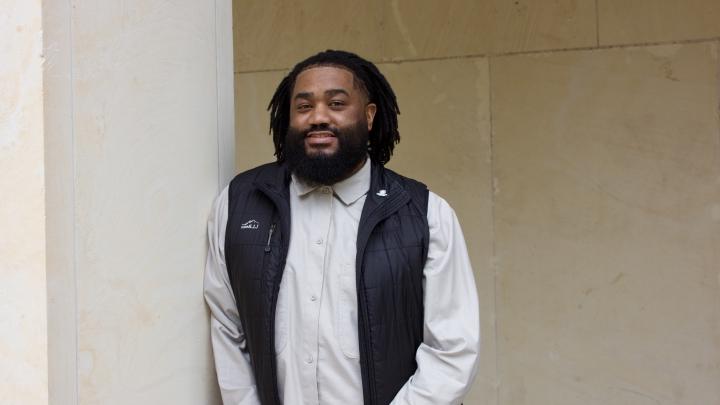
Justin Mynar ’02, Ph.D., has always believed in the importance of learning the fundamentals. Whether it was on the football field or in the chemistry lab, he knew mastering them would put him one step ahead of the competition.
Mynar, vice president of Administration & Facilities for NEOM U, was born and raised in Hewitt, Texas, located just outside of Waco, and came to Trinity University to play football with the goal of becoming a high school football coach. He knew he would have to teach high school classes, so he began thinking about majoring in science and discovered his passion in an organic chemistry class.
“Organic chemistry seemed easy and fun to me,” Mynar recalls. “I did quite well in the organic chemistry class, did research that summer, and just got really into it.”
Mynar found Trinity to be a very respectful, nurturing environment where he could grow and learn how to ask the right questions.
“I was very lucky to go to Trinity. I feel like I won the lottery because it really set me up for the rest of my life and my career,” Mynar reflects. “I got into research very early—my freshman year, in fact—in the chemistry lab of Nancy Mills, and she was wonderful.”
Mills and Steven Bachrach served as important mentors for Mynar.
“Now that I have a career designing universities and their curriculum, I think about the student-to-faculty ratio. Trinity nails that. I think about all of the times Professor Mills and Professor Bachrach took the time to help me and talk with me about my work. As a student, that means a lot and goes a long way,” Mynar says.
In addition to Trinity’s innovative faculty, Mynar appreciated the opportunity to learn from the guest lecturers who would visit campus.
“I was blown away by the caliber of speakers Trinity brought in. I remember they would have lunch with the students, and I learned so much talking to these different people who came to campus,” Mynar says.
Mynar was part of the Beckman Scholars Program, a 15-month mentored research experience for exceptional undergraduate students in chemistry, biological sciences, or interdisciplinary combinations thereof.
“After graduating from Trinity, I went to UC Berkeley, which has a very high-powered chemistry department for graduate studies, and I was nervous and anxious going in. However, winning the Beckman Scholarship gave me the confidence I needed, and I’m so thankful to Trinity because I was so prepared when I got there,” Mynar says. “Trinity took the time to teach the fundamentals, so I was ready to hit the ground running in the lab, whereas other students may have had to play a little catch-up.”
Once he earned his doctorate from the University of California, Berkeley, Mynar moved to Japan and began working as a researcher at the University of Tokyo. Later that year, he was made an assistant professor.
“You could imagine a cowboy at one of the most traditional universities in Asia—that was me,” Mynar laughs.

Justin Mynar '02, Ph.D., spoke to potential students and staff about KAUST during the 2017 American Chemical Society National Meeting and Exposition in San Francisco.
He soon returned to Berkeley as a senior researcher and research manager, overseeing a lab staff of doctoral students and postdoctoral fellows, before he began working at King Abdullah University of Science and Technology in Thuwal, Saudi Arabia, where he played a pivotal role in founding the Department of Research Oversight and Planning.
Over the years, Mynar has experienced the value of his liberal arts education firsthand.
“I took a Middle Eastern history class at Trinity, and now I’ve been in the Middle East for more than 13 years. The liberal arts aspect of my Trinity education made me well-rounded, and not just in a way that I can carry on dinner conversations. It made me inquisitive and made me appreciate other cultures. It prepared me to live in Japan and now in the Middle East,” Mynar says.
When he designs a new curriculum, Mynar believes that the liberal arts are just as important as STEM courses in understanding new technologies.
“Artificial intelligence is the big buzz right now. It’s actually the humanities that help us comprehend and know what we should do with it,” Mynar says.
Mynar is grateful to be in a position where he can give back and inspire others to dream big like his own mentors did for him.
“It’s always important to be grateful because there are people in your life who make a huge impact. I’ve had some very good mentors in my life, and we’re lucky to have some of the best of the best at Trinity with the exceptional faculty,” Mynar says. “I mentor a lot of people myself now. That’s how I pay back the people like Professor Mills and Professor Bachrach who were so influential in my life.”
The quotations from Justin Mynar ’02, Ph.D., used throughout this story were taken from an interview conducted by Devin Saenger ’24 and Nicholas Cipolla ’25 with Kenneth Caruthers ’15. Saenger and Cipolla are both Beckman Scholars conducting research at Trinity University.


